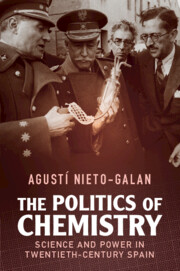Book contents
- The Politics of Chemistry
- Science in History
- The Politics of Chemistry
- Copyright page
- Dedication
- Contents
- Figures
- Preface
- Acknowledgements
- Chronology
- Abbreviations
- Introduction
- 1 Dreams of Modernity
- 2 A Republican Science
- 3 War Weapons
- 4 Totalitarian Ambitions
- 5 Autarchic Ambiguities
- 6 Technocratic Progress
- 7 Liberal Dissent
- Conclusion: The Moral Ambiguity of Chemistry
- Bibliography
- Index
3 - War Weapons
Published online by Cambridge University Press: 12 August 2019
- The Politics of Chemistry
- Science in History
- The Politics of Chemistry
- Copyright page
- Dedication
- Contents
- Figures
- Preface
- Acknowledgements
- Chronology
- Abbreviations
- Introduction
- 1 Dreams of Modernity
- 2 A Republican Science
- 3 War Weapons
- 4 Totalitarian Ambitions
- 5 Autarchic Ambiguities
- 6 Technocratic Progress
- 7 Liberal Dissent
- Conclusion: The Moral Ambiguity of Chemistry
- Bibliography
- Index
Summary
Chapter 3 discusses how the Civil War dramatically interrupted plans for modernisation, forcing chemists to get involved in war, and the way in which violence, repression and exile divided the chemical community. In the three years of the Civil War, the Republican order progressively faded away and a new dictatorship gained power and social support. War dramatically changed chemists’ daily practices and brought division and suffering to a politically polarised community. Involvement from both sides in the production of chemical gases and chemists’ contributions to strategies of civil defence made the morality of chemistry ambiguous, serving different ideological purposes. Some chemists in the new regime became active repressors, whereas others suffered exile and marginalisation. Political ideology played a crucial role in the ways in which power relations were dramatically reshaped and rearranged, but personal rivalries and professional tensions were probably more important than those expressed in the historical actors’ own accounts. Despite certain tacit trends of continuity, dynamic fields such as physical chemistry, spectroscopy and early biochemistry, which had flourished in the 1930s, had now lost momentum and were reshaped and reorganised. The Spanish conflict profoundly changed contemporary perceptions of science, politics, industry and the military.
Keywords
- Type
- Chapter
- Information
- The Politics of ChemistryScience and Power in Twentieth-Century Spain, pp. 83 - 111Publisher: Cambridge University PressPrint publication year: 2019



